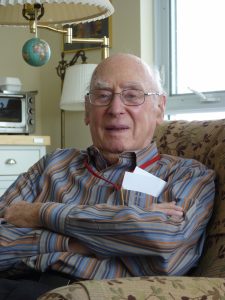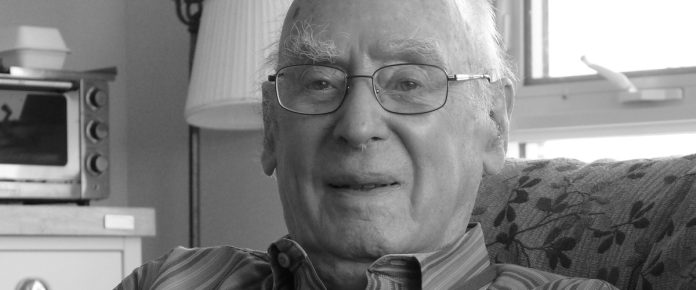By Judith van Berkom –
At 97-years-of-age, Keith Fraser enjoys his so-called “independent living” in an apartment at The Carlingwood Retirement Community in Kitchissippi ward. His daughter lives just 15 minutes away and does his groceries for him and his son lives near Hunt Club and visits often. Every day he enjoys dinner in the dining room and he is only responsible for his breakfast and lunch. He’s loving it.

Keith grew up in the Glebe and lived there all his life until he married. The couple moved to Westboro and they lived in the same house on Fraser Avenue for 53 years. He’s been a Rotarian with the West Ottawa Rotary Club for over 50 years.
The ability to memorize is one of his many talents. He developed a repertoire of 20 poems that he has illustrated and presented to groups of seniors. In his current building, he has hosted a cartooning workshop for the residents and as he spoke to KT he spontaneously recited an excerpt from a poem by Wordsworth:
I was thy neighbour once, thou rugged pile.
Three summer months I spent in sight of thee.
I saw thee every day and all the while
Thy form was sleeping on a glassy sea.
Keith joined the Royal Canadian Air Force (RCAF) during WWII, trained at McGill in radio theory for six months, and then went to Clinton, ON, to a radar school for another two months. “As soon as I graduated, I was sent overseas, first to Iceland for seven months, then back to England to refit. Then the squadron moved to the Azores,” explains Keith. On the troop ship on the way back to England, he heard Churchill declare the end of the war. “It was a good experience. I might have been a tail gunner or been in the army. God was looking after me I guess.”
After the war, the government provided him with free university education. He had always wanted to be a history teacher, and enrolled in the University of Toronto, but fell in love with geography instead. He came across a government notice stating that they were hiring geographers, switched and graduated with an MA from University of Toronto, and later a PhD from Clark University in Massachusetts.
In 1948, the government of Canada sent him, by himself, down the Mackenzie River and along the Arctic coast on an intelligence mission. “It was wonderful,” Keith says, adding that Canada didn’t know much about the Arctic back then.
He went north to the Western Arctic six times, mostly in May or June. “It was great until the mosquitoes came out,” Keith explains. He travelled with an assistant year after year. They lived in a tent and the sun was out 24 hours a day. We used to say: “What am I doing up here? This is awful,” but when the next year came, he could hardly wait to go.
Keith says it was the same for a lot of surveyors. His father was also a hydrographic surveyor, but it was hard on his mother and also hard on Keith’s wife, Joyce, being away for so many months a year.
Keith and Joyce married in 1949 and their daughter, Miriam, was born shortly after. Their son, Graham, was born seven years later. In 1958, Keith stopped going up north and moved from being a northern specialist with the government to becoming a leader in geographical names – names to identify lakes and rivers. “I liked that,” he says and was in that field for two or three years. He served as the executive secretary for several committees, including the Canadian Association of Geographers, of which he also served as president.
He finally retired from government just about the time the Royal Geographical Society needed a manager, a position he filled for another 10 years until a member of the board of directors asked him when he was going to retire. “I can retire anytime,” Keith said, and did. “It was the icing on the cake.”
“I think I’ve had an interesting life,” Keith says. He travelled for work, and later with his wife and family. His children, now adults, grew up with a fondness for travel. When he and his wife were in their eighties, a new member of the Rotary Club, originally from South Africa, organized a tour of his country.
Keith moved to The Carlingwood Retirement Community four years ago when his wife showed signs of Alzheimer’s disease and he was no longer able to take care of her and the house. “It’s interesting here,” he says. “Neither my wife nor I had to look after our parents, so coming here among all these old people was a brand new experience.”
Keith’s wife, Joyce, passed away quietly two years ago.
